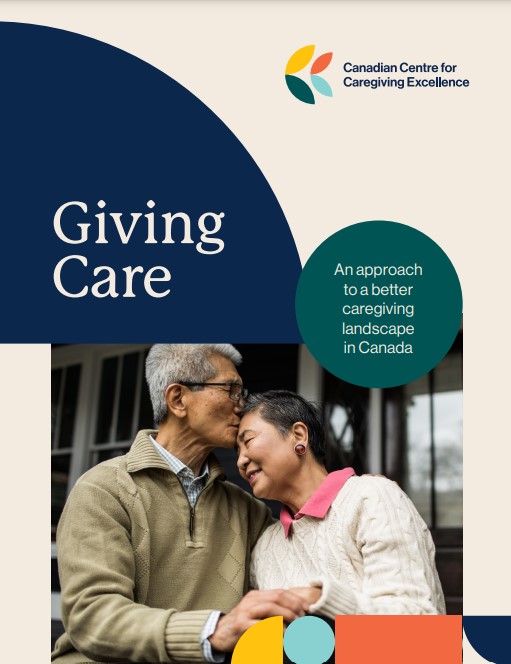 "Caregivers are the unseen and unacknowledged foundation upon which our health-care, social services and disability supports systems are built. Their labour to support care recipients from every walk of life make our economy tick and our society run. If all caregivers took a week off, every Canadian would experience the collapse of our care systems before noon on the first day.
"Caregivers are the unseen and unacknowledged foundation upon which our health-care, social services and disability supports systems are built. Their labour to support care recipients from every walk of life make our economy tick and our society run. If all caregivers took a week off, every Canadian would experience the collapse of our care systems before noon on the first day.
Unpaid caregivers and paid care providers make up the largest part of Canada’s health-care and social supports systems. Research shows that they provide approximately three hours of care for every hour provided through the rest of our systems. They help seniors living in the community or in long-term care settings; children and adults with physical, intellectual, or developmental disabilities; people with medical conditions; people experiencing mental illness; and people with changing support needs related to aging. The sustainability of Canada’s health-care and social systems relies on caregivers and care providers, but they are at a breaking point. (...)
Caregiving is the next frontier of public policy in Canada. This policy whitepaper aims to ignite a public conversation on the state of caregiving and how we can do better. Over the coming months, CCCE will work with caregivers, care providers, care recipients, policy makers and stakeholders across the country to help shape the caregiving future we need."
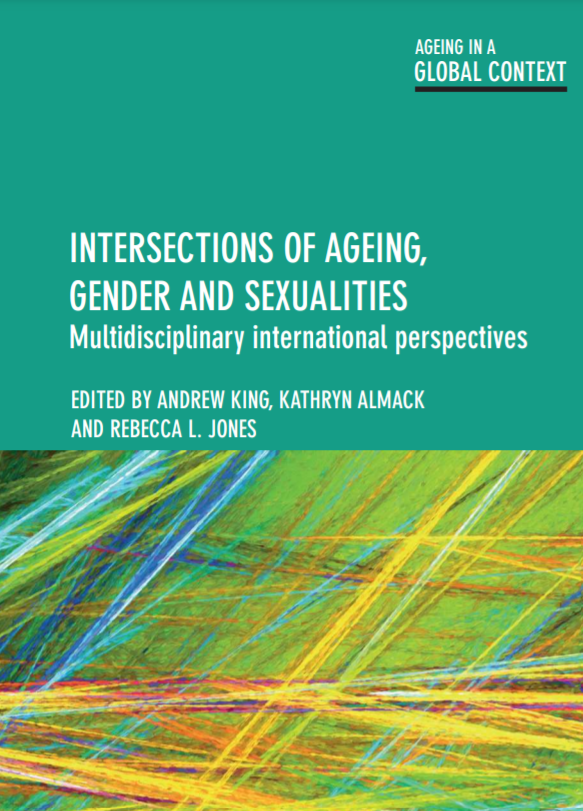 "With an increasingly diverse ageing population, we need to understand how social divisions intersect to affect outcomes in later life. Gender and sexuality are recognised as key factors in determining a person’s experience of later life but little research has been done into how age, gender and sexualities work together and with other divisions, including ethnicity and class, to form a range of inequalities and opportunities for people as they age. The collection brings together an international group of researchers and writers from Australia, Brazil, Denmark, Israel, Italy, Spain, South Africa, Sweden, Taiwan, the UK, and the USA, who argue for multiple, complex contextualised and spatialized approaches to understanding intersections of ageing, gender and sexualities and uneven outcomes in later life. The book highlights new ways of engaging with and thinking through questions related to ageing, gender and sexualities."
"With an increasingly diverse ageing population, we need to understand how social divisions intersect to affect outcomes in later life. Gender and sexuality are recognised as key factors in determining a person’s experience of later life but little research has been done into how age, gender and sexualities work together and with other divisions, including ethnicity and class, to form a range of inequalities and opportunities for people as they age. The collection brings together an international group of researchers and writers from Australia, Brazil, Denmark, Israel, Italy, Spain, South Africa, Sweden, Taiwan, the UK, and the USA, who argue for multiple, complex contextualised and spatialized approaches to understanding intersections of ageing, gender and sexualities and uneven outcomes in later life. The book highlights new ways of engaging with and thinking through questions related to ageing, gender and sexualities."
King, Andrew, and Kathryn Almack, eds. Intersections of Ageing, Gender, Sexualities. Bristol: Bristol University Press, 2019. https://openresearchlibrary.org/content/14844558-066b-417b-b1ba-3c700424b02e.
Source: Policy Press, University of Bristol
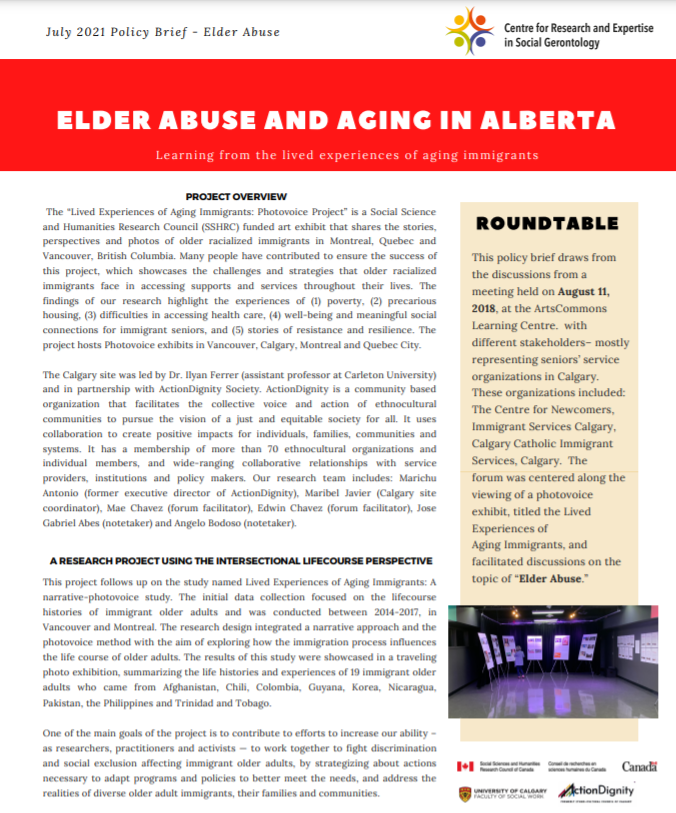 Learning from the lived experiences of aging immigrants
Learning from the lived experiences of aging immigrants
July 2021 Policy Brief - Elder Abuse
This policy brief draws from the discussions from a meeting held on August 11, 2018, at the Arts Commons Learning Centre with different stakeholders – mostly representing seniors’ service organizations in Calgary. These organizations included: The Centre for Newcomers, Immigrant Services Calgary, Calgary Catholic Immigrant Services, Calgary. The forum was centered along the viewing of a photovoice exhibit, titled the Lived Experiences of Aging Immigrants, and facilitated discussions on the topic of “Elder Abuse.”
Content:
1. Statistical Portrait
2. Isssues and Realities
3. Ways Forward
Source: Centre for Research and Expertise in Social Gerontology
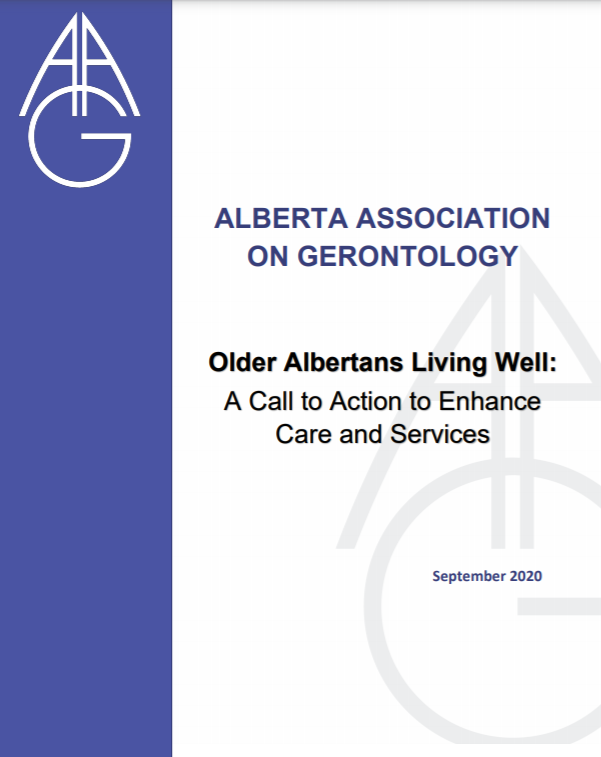 ''This document provides important information for consideration in developing long range directional policies and immediate actions to improve seniors care and services in Alberta. The document contains Directional Policy Recommendations as well as Immediate Actions Recommendations. Directional policies are broad policy objectives used to guide future initiatives and activities towards achieving the goal of the new vision, in this case, the seniors care and services sector in Alberta. Immediate actions are actions to be undertaken in the coming fiscal year (2021/22) to initiate changes towards the new vision.''
''This document provides important information for consideration in developing long range directional policies and immediate actions to improve seniors care and services in Alberta. The document contains Directional Policy Recommendations as well as Immediate Actions Recommendations. Directional policies are broad policy objectives used to guide future initiatives and activities towards achieving the goal of the new vision, in this case, the seniors care and services sector in Alberta. Immediate actions are actions to be undertaken in the coming fiscal year (2021/22) to initiate changes towards the new vision.''
Source: Alberta Association on Gerontology
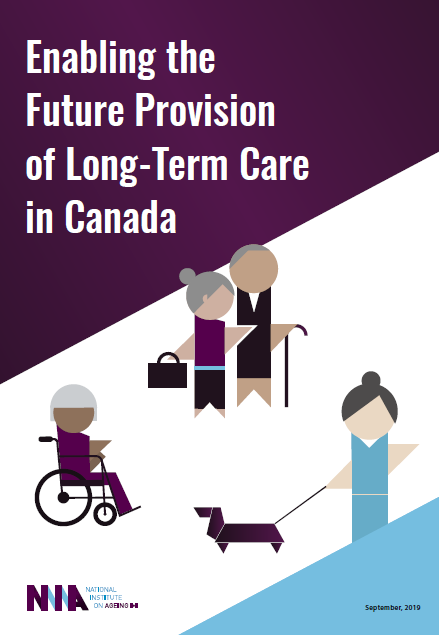 ''The NIA’s Future of Long-Term Care Policy Series ReportsIn the inaugural report of this series, Dr. Samir Sinha, the NIA’s Director of Health Policy Research, and his team will explore the current provision of long-term care across Canada and place it within the global context of comparable countries that are also tackling significant demographic transitions as they redevelop their transitions as they redevelop their systems of care.
''The NIA’s Future of Long-Term Care Policy Series ReportsIn the inaugural report of this series, Dr. Samir Sinha, the NIA’s Director of Health Policy Research, and his team will explore the current provision of long-term care across Canada and place it within the global context of comparable countries that are also tackling significant demographic transitions as they redevelop their transitions as they redevelop their systems of care.
While Canada’scurrent challenges will be highlighted, so too will evidence-informed opportunities and enablers of innovation in this growing and important area of care. Dr. Sinha’s report will set the health policy stage for the rest of the series, which will work towards developing clear recommendations for government policy and decision-makers, care providers, and citizens to consider that can improve the approach to the future provision of long-term care within the fiscal reality all governments are facing.''
Source: National Institute on Ageing
Page 13 of 31

















